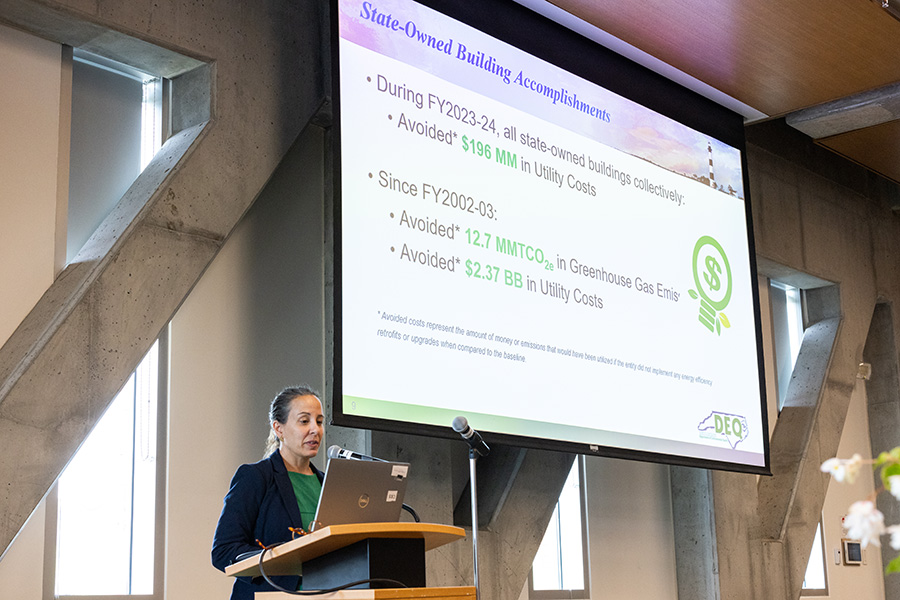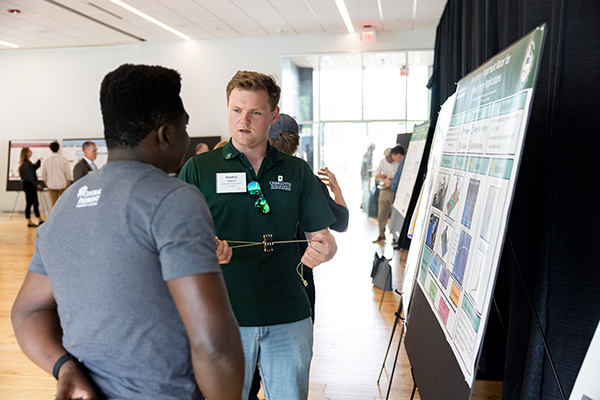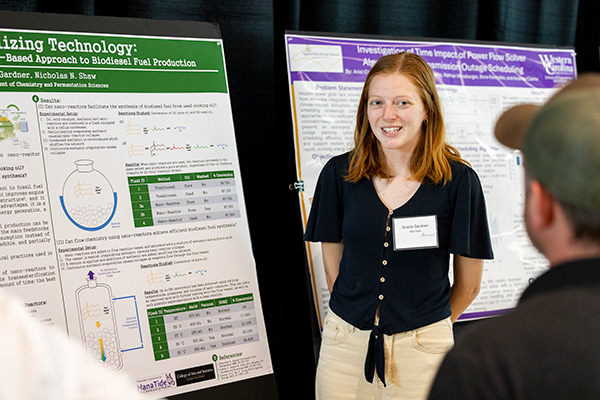
Sheila Blanchard, program analyst II at the North Carolina State Energy Office, speaks at App State’s 2025 Appalachian Energy Summit, where she announced that the UNC System, North Carolina community colleges and other state agencies have achieved $2.37 billion in avoided energy costs since 2002–03 — exceeding the target goal of $2 billion a year ahead of schedule. This year's Appalachian Energy Summit was held June 4–6 at App State’s Boone campus. Photo by Chase Reynolds
BOONE, N.C. — Appalachian State University and its University of North Carolina System peers, North Carolina community colleges and other state agencies have realized $2.37 billion in avoided energy costs over the last 22 academic years (2002–03 to 2023–24) — exceeding the target goal of $2 billion a year ahead of schedule. This significant achievement was highlighted during the university’s 2025 Appalachian Energy Summit, held June 4–6 at App State’s Boone campus.
Since 2012, the Appalachian Energy Summit — a multiday, annual event envisioned and hosted by App State — has gathered faculty, staff and students from colleges and universities, along with energy managers and visionaries and government and industry leaders, to share research and develop processes and systems for improving energy efficiency across the UNC System, the state and beyond. Support from corporate sponsors and private donors allows participants to attend free of charge.
“When the Summit first started 13 years ago, App State initiated the goal of helping the state avoid $1 billion in energy costs by 2020 and further expanded the goal to $2 billion avoided costs by 2025,” explained Sheila Blanchard, program analyst II at the North Carolina State Energy Office. “We are very appreciative of App State’s role in catalyzing these lofty goals, and for the role the Appalachian Energy Summit plays in bringing together state government officials and energy representatives across the state to work toward our collective Utility Savings Initiative goals.”
“These significant cost savings make a direct, bottom line impact for tight budgets across the state, and we continue to improve campus energy efficiency while also boosting system reliability,” said App State Chancellor Heather Norris.

Nearly 40 speakers, including App State faculty, staff, students and alumni, took part in the 2025 Appalachian Energy Summit held June 4–6 at App State’s Boone campus. Pictured on the Valborg Theatre stage, from left to right, are summit speakers Rob Howard, lecturer in App State’s Department of Sustainable Technology and the Built Environment; Rob Leonard, owner and manager of Beeson Acres Resources LLC; Chris Moeller, founder and CEO of Orion Growth; and Karan Gupta, principal at Elemental Consulting. Photo by Kyla Willoughby
According to App State Energy Manager Jonathan Pierson, the university has achieved $72.6 million in avoided energy costs and $17.8 million in avoided water use costs since 2002–03, for a combined total of more than $90 million in utility savings. Additionally, App State’s nearly 50% reduction in energy use per square foot — also known as energy usage intensity (EUI) — continues to surpass the state goal of a 40% EUI reduction in state-owned buildings by 2025 (measured from baseline 2002–03 fiscal year levels).
Avoided costs represent the amount of money or emissions that would have been utilized if state entities did not implement any energy efficiency retrofits or upgrades when compared to the baseline fiscal year (2002–03), according to the State Energy Office. These measures include LED lighting upgrades, building automation, HVAC enhancements, building envelope improvements and more.
Each year, these savings are calculated by multiplying the amount of energy a state entity has saved by the relevant avoided cost rate (rates are determined by the North Carolina Utilities Commission). Increases in energy and water costs — from the baseline year of 2002–03 through 2023–24 — are considered in the avoided costs calculations.
The UNC System has “proven to be the pinnacle of energy management,” as highlighted in the latest State Energy Office annual report: The System experienced a 34% reduction in EUI from the 2002–03 baseline, despite a 65% increase in square footage over the same time frame. Such energy efficiency practices resulted in avoided utility costs of over $148 million for the UNC System alone in fiscal year 2023–24.
“For two decades, North Carolina and the UNC System have made remarkable strides in energy savings, and the Appalachian Energy Summit is proud to have been a catalyst for realizing those achievements,” said Mike Kapp, App State’s director of Sustainability and Energy Management. “We’re proud to have this role in advancing innovations and strategies that will drive continued energy efficiency and savings in our state’s future.”
At App State, campus infrastructure projects focus on improving system reliability and reducing operational costs, helping the university maintain modern, efficient facilities that serve students, faculty and staff effectively. Year to date, Pierson said, campus energy costs are down 13.8% — or $1,065,310 — compared to the same period last fiscal year, and 13.5% lower than the three-year average. These cost reductions come despite a 9% increase in heating degree days and the addition of about 225,000 square feet of new building space. Pierson credited the dedication of App State’s Facilities Operations team, which he said has been critical to operating campus buildings efficiently and reliably over the long term.
Energy savings projects completed in fiscal year 2024–25 include:
- Anne Belk Hall chilled water system overhaul — $53,012 in savings
Anne Belk Hall’s chilled water system underwent a comprehensive overhaul that included installing a new variable frequency drive, head pressure controls and building automation system integration to avoid the higher costs of complete system replacement. The upgraded system now provides efficient cooling to four academic buildings on campus, including critical laboratory space in Rankin Science North. - John E. Thomas HVAC controls upgrade — $49,679 in savings
The building’s outdated heating and cooling network control system is being replaced with modern building automation control network technology. The remaining installation work is scheduled for completion during the 2026 fiscal year. - Holmes Convocation Center chiller controls — $34,844 in savings
The Holmes Center’s cooling system has received significant upgrades, including new variable frequency drives, automated valves and advanced control systems to improve energy efficiency and temperature management. A second phase of upgrades is planned for the 2026 fiscal year to complete the modernization project. - Academic Building LED lighting upgrades — $23,049 in savings
Two Boone campus buildings — Rankin Science West and the Human Resources Building — received energy-efficient LED lighting installations to replace outdated fixtures, with three more buildings set for upgrades in fiscal year 2026. - Student Recreation Center AHU3 reheat coil — $16,100 in savings
The Student Recreation Center’s air handling system received a new reheat coil to better control humidity levels, specifically for the facility’s basketball courts. App State’s student-led Renewable Energy Initiative was a partner in this effort, providing funding support that covered 31% of the total cost.
App State’s 2025 Appalachian Energy Summit featured a student poster competition, during which undergraduate and graduate students from across the state presented their energy-related research. Cash prizes were awarded for the top posters in the undergraduate and graduate categories. This year’s Appalachian Energy Summit was held June 4-6 at App State’s Boone campus. Photo by Kyla Willoughby
During the three-day summit, working groups met to discuss energy topics such as campus-based energy efficiency, high-performance campus design and pathways toward zero waste. Nearly 40 speakers, including App State faculty, staff, students and alumni, took part in the summit’s sessions, which also included response and resiliency efforts in the wake of Hurricane Helene.
The summit also featured a student poster competition, during which undergraduate and graduate students from across the state presented their energy-related research. Cash prizes were awarded for the top posters in the undergraduate and graduate categories.
“App State’s efforts to improve energy efficiency, enhance system reliability and expand renewable energy are ongoing,” said Pierson. “The continued commitment of Appalachian Energy Summit partners is essential, as there are still significant energy opportunities to pursue — to ensure a resilient and strong energy future for North Carolina.”
What do you think?
Share your feedback on this story.
App State-hosted Energy Summit highlights nearly $2 billion in statewide avoided energy costs
About Appalachian State University
As a premier public institution, Appalachian State University prepares students to lead purposeful lives. App State is one of 17 campuses in the University of North Carolina System, with a national reputation for innovative teaching and opening access to a high-quality, cost-effective education. The university enrolls more than 21,000 students, has a low student-to-faculty ratio and offers more than 150 undergraduate and 80 graduate majors at its Boone and Hickory campuses and through App State Online. Learn more at https://www.appstate.edu.







![How NCInnovation Is Rethinking Economic Development in North Carolina [faculty featured]](/_images/_posts/2026/02/rethinking-economic-development-600x400.jpg)








